

Henry Siegman reviews ‘The Accidental Empire’ by Gershom Gorenberg and ‘Lords of the Land’ by Idith Zertal and Akiva Eldar · LRB 10 April 2008. The title of Gershom Gorenberg’s book is somewhat misleading in its suggestion that the establishment of Jewish settlements in the West Bank and Gaza was ‘accidental’.
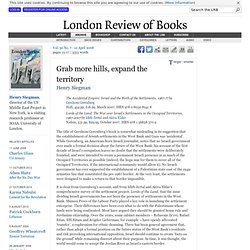
While Gorenberg, an American-born Israeli journalist, notes that no Israeli government ever made a formal decision about the future of the West Bank, his account of the first decade of Israel’s occupation leaves no doubt that the settlements were deliberately founded, and were intended to create a permanent Israeli presence in as much of the Occupied Territories as possible (indeed, the hope was for them to cover all of the Occupied Territories, if the international community would allow it). No Israeli government has ever supported the establishment of a Palestinian state east of the 1949 armistice line that constituted the pre-1967 border. At the very least, the settlements were designed to make a return to that border impossible. The story is a lie. Has violent sociopathic elements. Annals of Settler Colonialism: British Atrocities in Post-War Kenya.
The anti-colonial movement in Kenya of the 1950s was mythologized by the British as a shadowy ‘Mau-Mau,’ an irrational outbreak of aimless hatred.
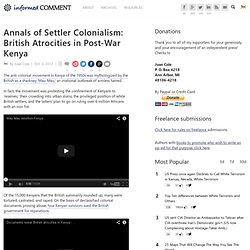
In fact, the movement was protesting the confinement of Kenyans to ‘reserves,’ their crowding into urban slums, the privileged position of white British settlers, and the latters’ plan to go on ruling over 6 million Africans with an iron fist. Of the 15,000 Kenyans that the British summarily rounded up, many were tortured, castrated, and raped. On the basis of declassified colonial documents proving abuse, four Kenyan survivors sued the British government for reparations. You wonder if the settler-colonial officials who ordered castration of freedom fighters were aware of its symbolic purport for their enterprise. Security for Israeli settlers, not for Palestinians. The Colonial Present: Afghanistan. Palestine. Iraq.
Vol 2, No 1 (2012) - Past is Present: Settler Colonialism in Palestine. New Texts Out Now: Past Is Present: Settler Colonialism in Palestine. Omar Jabary Salamanca, Mezna Qato, Kareem Rabie, and Sobhi Samour, editors.
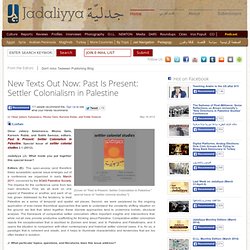
Past Is Present: Settler Colonialism in Palestine. Special Issue of settler colonial studies 2.1 (2012). Jadaliyya (J): What made you put together this special issue? Editors (E): This open-access (and therefore freely accessible) special issue emerges out of a conference we organized in early March 2011, convened by the SOAS Palestine Society. The impetus for the conference came from two main directions.
J: What particular topics, questions, and literatures does this issue address? Editors (E): We wanted to encourage the further integration of settler colonial studies into Palestine studies, and we felt the best way to do that would be to show how settler colonial analysis contributes to our understanding of Zionism and the Palestinian experience. J: Who do you hope will read this special issue, and what sort of impact would you like it to have? Israel, Palestine: Settler Colonialism and Self-determination.
By Brian Durrans – London The seventh annual conference of the very active SOAS Palestine Society attracted some 300 people over the weekend of 5-6 March 2011 (SOAS is the School of Oriental and African Studies in Bloomsbury and the event was hosted by its London Middle East Institute).
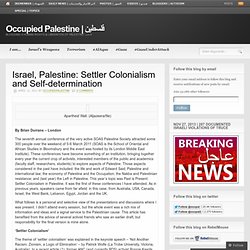
Exploitation of Palestinian Labour in Contemporary Zionist Colonialism. Settler Colonialism and the State of Exception: The Example of Israel/Palestine. Abstract Discourse on Israel, both propagandistic and analytical, has the peculiar tendency of representing it at one moment as normal – a normal democracy, a normal Western society, a normal state – and at others as exceptional: a democracy uniquely embattled among hostile neighbors, a secular state that historically fulfills the religious destiny of a people, a democracy that defines itself as a state for a single people and religion, the only democracy in the region, and so forth.
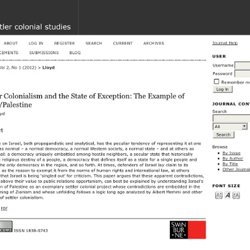
At times, defenders of Israel lay claim to its normality as the reason to exempt it from the norms of human rights and international law, at others complain that Israel is being ‘singled out’ for criticism. Settler Colonialism : Lorenzo Veracini. Settler colonialism is a global and transnational phenomenon, and as much a thing of the present as a thing of the past.
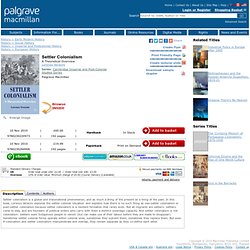
In this book, Lorenzo Veracini explores the settler colonial 'situation' and explains how there is no such thing as neo-settler colonialism or post-settler colonialism because settler colonialism is a resilient formation that rarely ends. Not all migrants are settlers: settlers come to stay, and are founders of political orders who carry with them a distinct sovereign capacity. And settler colonialism is not colonialism: settlers want Indigenous people to vanish (but can make use of their labour before they are made to disappear).
Sometimes settler colonial forms operate within colonial ones, sometimes they subvert them, sometimes they replace them. But even if colonialism and settler colonialism interpenetrate and overlap, they remain separate as they co-define each other.